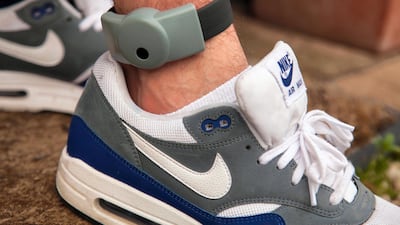Legal experts say a new drive for electronic tagging will remove the need for low risk offenders to stay out of jail.
An initial bill was passed by the Federal National Council last year and was reviewed again on Monday by senior government officials.
Under the scheme, prisoners on parole or defendants facing trial could have the sophisticated monitoring device fitted to their ankles.
The Emirates is understood to be one of the first Arab nations to introduce tagging. Algeria began tagging some of its prisoners in 2017.
“The electronic monitoring device is capable of pinning the geographical location of the person wearing it, helping criminal enforcement [to] keep track of a suspect under investigation, an accused on trial or a convict serving a sentence or community service,” a statement from the Ministerial Development Council said.
“This step comes in line with modern penal principles of the UAE and it enhances the integration of convicts [back] into society.”
Criminal law experts and a former prisoner said the proposal would allow low risk offenders to get on with their lives.
Abu Dhabi Police is understood to have successfully trialled tagging with more than 130 inmates in 2018.
Ahmad Mohamad Abdelzaher, a criminal law professor at Cairo University and legal consultant in the Emirates, said the correct use of the technology would act as a deterrent to prisoners ignoring scheduled court appearances and attempting to flee the country.
He also urged authorities to act quickly to ensure the law - passed by the FNC in September - was approved by the UAE’s Supreme Court.
“It will require special equipment as well as authorities to specify the radius in which the [prisoner] can move,” he said.
“It will also make it unnecessary to ask for bail and guarantees.”
A former prisoner, held in Al Wathba prison in Abu Dhabi for more than a year following his conviction for a financial crime, also welcomed the policy change.
The ex-convict, who did not want to be named, revealed how many inmates locked up for minor financial crimes would benefit from being released with a tag as it would give them the freedom to address the dispute which caused their incarceration.
He claimed making and receiving phone calls was very difficult from jail, preventing prisoners from putting their affairs in order.
“I have been inside so I know what it's like," said the Emirati. “When you lock up people, you take away all their resources.
“When you have a financial case against you, you need to speak to your lawyers, business partners and people on the outside to help you settle your case.
“This is impossible when you’re in prison. People don’t take your calls and your business partners cannot visit you easily.
“Electronic tags are an opportunity for prisoners to settle their affairs. I’ve seen prisoners in jail over Dh500 which they could have easily paid if they were on the outside.
“These are good people who were put in jail for minor financial crimes. It’s unfair for them to be in prison and they should be given the opportunity to at least resolve their issues.”
Alia Almarar, an addiction specialist at Erada Rehabilitation and Treatment Centre in Dubai, said she supported the use of electronic tags, particularly for young offenders.
She also said that society would be more accepting of individuals with an electronic tag than those in prison and that the tagging system would make it easier for prisoners to attend rehabilitation sessions.
“It reduces the risks of them mixing with other inmates and learning other negative habits from them," she said. "It will also reduce the number of prisoners in UAE prisons."
Many countries around the world already use electronic tags on prisoners. The technology allows authorities to ensure individuals adhere to any parole conditions set by the courts, such as staying away from set locations or individuals.
Under the UAE law, tags could be fitted to anyone facing trial, on bail or who has been placed under house arrest.
Anyone convicted of the same crime twice is understood to be ineligible for tagging, as are those linked to serious crimes such as sex or drug offences.
This article has been amended to reflect Abu Dhabi Police carrying out electronic tagging in 2018
